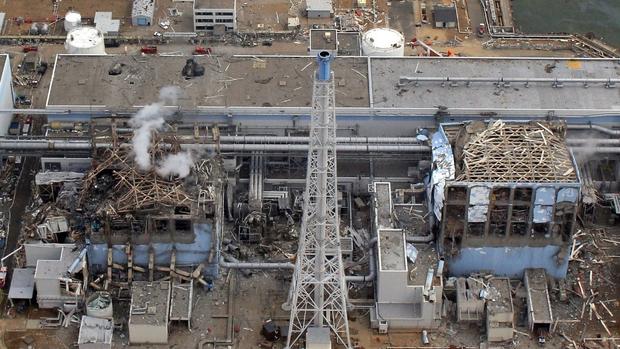 This file handout picture taken by an unmanned aerial vehicle (UAV) from the Air Photo Service on March 20, 2011 shows the stricken Tokyo Electric Power Company (TEPCO) Fukushima Daiichi No.1 nuclear power plant reactor number three (left) and four (right), with smoke rising from number three, in the town of Okuma in Fukushima prefecture. (PHOTO / AFP)
This file handout picture taken by an unmanned aerial vehicle (UAV) from the Air Photo Service on March 20, 2011 shows the stricken Tokyo Electric Power Company (TEPCO) Fukushima Daiichi No.1 nuclear power plant reactor number three (left) and four (right), with smoke rising from number three, in the town of Okuma in Fukushima prefecture. (PHOTO / AFP)
SEOUL / TOKYO - South Korean President Moon Jae-in ordered officials on Wednesday to explore petitioning an international court over Japan’s decision to release water from its Fukushima nuclear plant, his spokesman said, amid protests by fisheries and environmental groups.
South Korea strongly protested against the decision, summoning Koichi Aiboshi, Tokyo’s ambassador in Seoul, and convening an intra-agency emergency meeting to craft its response
Japan unveiled plans on Tuesday to release more than 1 million tonnes of contaminated water into the sea from the plant crippled by a 2011 earthquake and tsunami, starting in about two years after filtering it to remove harmful isotopes.
South Korea strongly protested against the decision, summoning Koichi Aiboshi, Tokyo’s ambassador in Seoul, and convening an intra-agency emergency meeting to craft its response.
Moon, at a separate meeting on Wednesday, called for looking into ways to refer Japan’s move to the International Tribunal for the Law of the Sea, including filing for an injunction, his spokesman Kang Min-seok told a briefing.
Moon also expressed concerns about the decision as Aiboshi presented his credentials, having arrived in South Korea in February for the ambassador’s post.
“I cannot but say that there are much concerns here about the decision as a country that is geologically closest and shares the sea with Japan,” Moon said, asking Aiboshi to convey such worries to Tokyo, according to Kang.
READ MORE: Study: Contaminants in Fukushima water to cross Pacific Ocean
A series of protests against the move by politicians, local officials, fishermen and environmental activists took place in South Korea on Wednesday, including in front of the Japanese embassy in Seoul and consulates in the port city of Busan and on Jeju island.
A coalition of 25 fisheries organisations staged a rally and delivered a written protest to the embassy, urging Tokyo to revoke the decision and Seoul to ban imports of Japanese fisheries.
“Our industry is on course to suffer annihilating damage, just with people’s concerns about a possible radioactive contamination of marine products,” it said in a statement.
ALSO READ: S. Korea summons Japan envoy over Fukushima water decision
The progressive minor opposition Justice Party and some 30 anti-nuclear and environmental groups called Japan’s move “nuclear terrorism,” and said they sent the Japanese embassy a list of signatures of more than 64,000 people opposed to the move collected from 86 countries since February.
Tepco plan to restart halted
In another development, Japan’s Nuclear Regulation Authority (NRA) said on Wednesday that Tokyo Electric Power Co (Tepco), operator of the wrecked Fukushima Daiichi nuclear plant, will be prevented from restarting its only operable atomic power station after safety breaches at the facility were uncovered last year.
The move deals a major blow to Tepco’s hopes of restarting the Kashiwazaki-Kariwa station, the world’s biggest atomic power plant with capacity of 8,212 megawatts, in a quest to slash the utility’s operating costs by more than US$800 million a year.
Tepco suffered a barrage of criticism in March when the failings came to light, including security mis-steps that led to an unauthorised staff member accessing sensitive areas of the plant. Japan’s industry minister said at the time Kashiwazaki-Kariwa plant would not be restarted any time soon, as regulators slammed the breaches, which included failure to protect nuclear materials.


